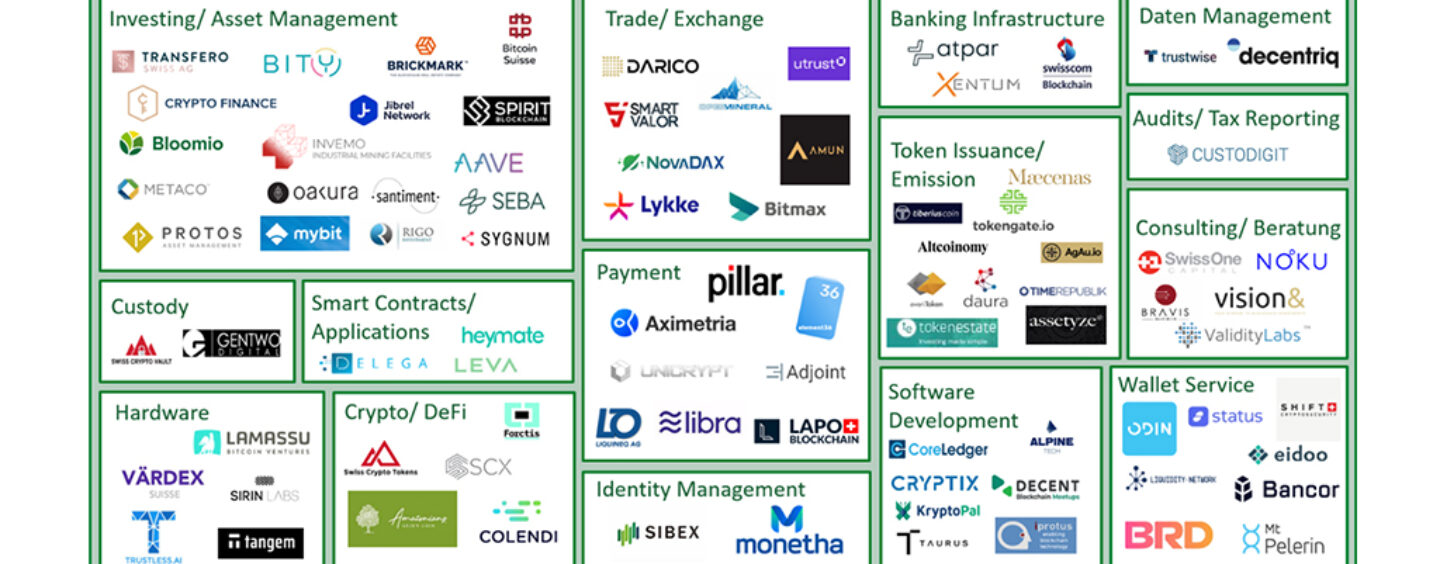
A Look at Switzerland’s Blockchain DLT Fintech Industry
by Fintechnews Switzerland November 26, 2020A recent analysis by ccecosystems.news has identified 167 blockchain and distributed ledger technology (DLT) startups focusing on financial services in Switzerland. Out of the 167 companies, only 117 had a valid Internet presence, implying that about 30% of these ventures might have already been disbanded, according to an article summing up the findings.

Visual classification of Swiss blockchain:DLT fintechs, Fintech Landscape in Switzerland: Blockchain, Nov 2020, by Klara Krämer
The analysis found that most blockchain/DLT fintechs in Switzerland currently offer several products and services, with that number typically ranging anywhere between two and five bundled services.
The majority of them provide products and services in the cryptocurrency space, which comprises services for the trading and sale of cryptocurrencies as well as crypto wallet services (59%), followed by investment and asset management, which includes the offering, management and custody of digital assets (57%); and token issuance, which refers to startups using blockchain to digitally display and distribute assets (46%).

Services offered by Swiss FinTechs based on blockchain and DLT, Fintech Landscape in Switzerland: Blockchain, Nov 2020, by Klara Krämer
Across all categories, 35% of Swiss blockchain fintechs only operate under a business-to-customer (B2C) model, while 31% are pure business-to-business (B2B) players, and 34% offer services for both companies and end customers.
In the B2C segment, the analysis found that cryptocurrency services are mainly offered to investors, which shows a gap in terms of potential customer groups, especially for younger and lower-income populations.
Overall, the Swiss blockchain fintech space was found to be highly concentrated around a few areas and models, implying that there are still plenty of opportunities to tap into.
Switzerland’s blockchain sector
Switzerland is rapidly emerging as a leading blockchain and crypto hub, being home to more than 900 blockchain-related companies located the so-called Crypto Valley, according to CV VC Blockchain report.
As of January 2020, Crypto Valley counted five unicorns valued at more than US$1B: Ethereum (US$14.4B), Dfinity (US$2B), Polkadot (US$1.2B), Bitmain (US$1B) and Libra (US$1B). Four out of the five are headquartered in Switzerland, while Bitmain is originally from China and headquartered in Beijing.
Switzerland hosts a number of renowned research institutes focusing on blockchain including the Center of Digital Trust in Lausanne, the Crypto Valley Academy in Zug, and the Blockchain Center at the University of Zurich. And each year, some of the biggest blockchain events are held in the country such as the Crypto Finance Conference, the CV Summit, and the Geneva Blockchain Congress.
In September, the second chamber of the parliament adopted an amending act to further improve Switzerland’s framework conditions for DLT/blockchain companies, further strengthening its position as a leading location for blockchain innovation, according to a Swissinfo.ch report.
The so-called Blockchain Act will update the banking, corporate and financial infrastructure laws to accommodate blockchain companies, and could potentially open the doors to decentralized finance as well as the creation of digital company shares.
In 2019, the Swiss Financial Market Supervisory Authority (FINMA) became the first financial regulator to authorize crypto-focused lenders, granting banking licenses to SEBA Bank and Sygnum.
Both provide digital asset services including accounts and custody, trading and investment, serving institutional and private qualified investors, corporates, banks and other financial institutions.





